 MyDogBreeds
MyDogBreeds Both Norfolk Terrier and Gordon Setter are originated from United Kingdom. Norfolk Terrier may grow 44 cm / 17 inches shorter than Gordon Setter. Norfolk Terrier may weigh 30 kg / 66 pounds lesser than Gordon Setter. Norfolk Terrier may live 3 years more than Gordon Setter. Norfolk Terrier may have less litter size than Gordon Setter. Both Norfolk Terrier and Gordon Setter requires Moderate maintenance.
Both Norfolk Terrier and Gordon Setter are originated from United Kingdom. Norfolk Terrier may grow 44 cm / 17 inches shorter than Gordon Setter. Norfolk Terrier may weigh 30 kg / 66 pounds lesser than Gordon Setter. Norfolk Terrier may live 3 years more than Gordon Setter. Norfolk Terrier may have less litter size than Gordon Setter. Both Norfolk Terrier and Gordon Setter requires Moderate maintenance.
 It was in the 1880s that a working terrier was developed in eastern England. The Norfolk Terrier was developed by crossing local terrier-like dogs with the Irish Terrier breed as well as small red terriers.
It was in the 1880s that a working terrier was developed in eastern England. The Norfolk Terrier was developed by crossing local terrier-like dogs with the Irish Terrier breed as well as small red terriers.
Known first as the Cantab Terrier and then later as the Trumpington Terrier, the name changed further but in 1932, the Norwich was accepted into the English Kennel Club and the first written standard was created.
The Norfolk Terrier was recognized by the United Kennel Club in 1979. It has gained recognition as an independent breed but is a variety of the Norwich Terrier, distinguished from it by having floppy ears and not erect ears. Both the Norfolk- and Norwich are the smallest of the working terriers.
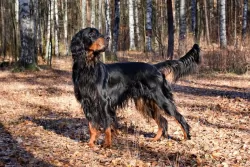 The Gordon Setter includes mixes of the English Setter and the Irish Setter. The original purpose of the breed was to hunt game birds.
The Gordon Setter includes mixes of the English Setter and the Irish Setter. The original purpose of the breed was to hunt game birds.
The dog breed hails from Scotland with a history that dates back to the 17th century. The dog was developed in Gordon Castle by the Duke of Gordon IV.
The dog became popular among hunters in the early 19th century. He is the biggest of the setter breeds. It was in 1884 that the American Kennel Club recognized the Gordon Setter.
 The Norfolk Terrier is a small purebred dog, standing at 23 to 25cm in height and weighing roughly between 4.5kg and 6kg. The dog has a wire-haired coat which can be in different colors such as wheaten, red, black and grey or grizzle.
The Norfolk Terrier is a small purebred dog, standing at 23 to 25cm in height and weighing roughly between 4.5kg and 6kg. The dog has a wire-haired coat which can be in different colors such as wheaten, red, black and grey or grizzle.
The hair on his head and ears is shorter and smoother and he has longer whiskers and eyebrows. The chest is deep, the front legs are short and straight and the tail has always been docked to half its length but left long these days. The tail is set high and carried erect.
Norfolks are feisty, fearless dogs with an independent streak. They’re gentle though, and when it comes to being a companion dog, they get on well with children and other pets. They thrive on their human family’s companionship and wouldn’t do well at all if they were constantly left outside.
They’re not yappy dogs but will bark occasionally so he can sound the alarm if strangers approach.
This little dog is able to live in the city or the countryside, but just because he is little, you can’t neglect his exercise needs. He will most certainly need to be exercised every day and taken for walks as he is an energetic, lively dog. He is intelligent too and easy to train and socialize, turning him into such an obedient, pleasurable pet.
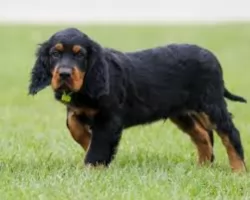 The Gordon Setter is a large dog, capable of reaching up to 69cm in height and weighing up to 36kg in weight.
The Gordon Setter is a large dog, capable of reaching up to 69cm in height and weighing up to 36kg in weight.
He belongs to the Setter family and is somewhat heavier than the other Setter breeds. Setter dogs are classified as sporting- or gun dogs. He is a beautiful dog with a pitch black coat with tan markings found around the chest, muzzle and paws as well as those two familiar tan dots above each eye.
Sometimes you can find a small amount of white on the chest. The coat is straight and silky but it can be slightly waved with feathering around the legs, chest, ears and tail. Both the tail and the ears of the dog are also long and feathery. The Gordon has an intelligent, dignified look about him.
The Gordon Setter is a confident, fearless, loyal and affectionate dog. They do well with their human families, when there are other pets in the house as well as children.
He can be a boisterous dog so training and socialization will become necessary. Your Gordon Setter is an intelligent dog and also a dog ready and willing to learn. He is calm and even-tempered but playful too.
He isn’t a dog suited to life in the city if there isn’t an adequately sized garden. He is essentially a country life dog well suited to farms or large fenced gardens.
 Fearless and brave, the Norfolk Terrier promises to be a wonderful companion.
Fearless and brave, the Norfolk Terrier promises to be a wonderful companion.
They're social, loving dogs and want to be part of the household. He is lively and active too and wants to be included in your walks and your games. He loves nothing more than to be running across a field after a ball.
They’re such amicable pets that they make great dogs for first-time dog owners. Let him into your heart and your home – he makes such a splendid pet – that once you’ve had one, you’ll realize you can never be without such a wonderful pet and companion again.
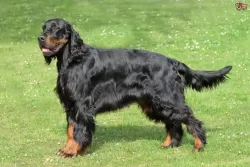 Beautiful to look at, the intelligent and even-tempered Gordon Setter has everything to be confident about. He loves the attention he gets from his human family and is always looking for a pat.
Beautiful to look at, the intelligent and even-tempered Gordon Setter has everything to be confident about. He loves the attention he gets from his human family and is always looking for a pat.
He can be stubborn and he certainly won't like the idea of being left cut off from his family for long periods of time as he is a social dog with those he knows and loves.
The Gordon Setter is energetic and playful so he will need regular exercise. When you bring a Gordon Setter into your home, you bring in a wonderfully loyal pet and companion.
 The life expectancy of your Norfolk Terrier is 8 to 14 years, but there are some who have received excellent care and who have reached 17 years of age.
The life expectancy of your Norfolk Terrier is 8 to 14 years, but there are some who have received excellent care and who have reached 17 years of age.
Just as with any other dog, they are prone to common dog illnesses, and these can include dental issues and mitral valve disease. They also are prone to hip dysplasia, and according to the Orthopedic Foundation for Animals (OFA) they are known for problematic hips.
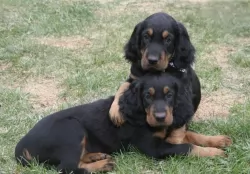 Life expectancy for the Gordon Setter is usually about 10 to 12 years and with good nutrition and care, your Gordon can easily reach 12 years of age.
Life expectancy for the Gordon Setter is usually about 10 to 12 years and with good nutrition and care, your Gordon can easily reach 12 years of age.
Every dog is prone to some common health issues and these include among others hip dysplasia, gastric torsion or bloat, retinal atrophy and ear infections.
Large dogs are more prone to hip dysplasia. The disease is a malfunction of the hip joints causing pain and loss of function in the rear legs.
This eye conditon just gets worse over time and can lead to vision loss.
An under-active thyroid causes a decrease in metabolism. Symptoms of hypothyroidism in dogs include weight gain, obesity, cold intolerance, changes in the skin and coat like hair loss and your dog is lethargic.
This can be very dangerous with your pet as the stomach is swollen and the stomach rotates and twists and can lead to death.
 The Norfolk Terrier’s hard, wiry, straight coat requires being hand stripped about twice a year by hand or with a stripping knife. The paws will also need to be trimmed.
The Norfolk Terrier’s hard, wiry, straight coat requires being hand stripped about twice a year by hand or with a stripping knife. The paws will also need to be trimmed.
It is recommended to keep the hair short around the anus for hygienic purposes and the tail itself will need to be stripped.
The Norfolk doesn’t shed his coat naturally, and the hair keeps growing, making the dog uncomfortable and ungroomed looking. The dog will certainly need to have his hair kept away from around the eyes.
If you don’t want to strip your dog, there are people who take their dogs to professional groomers, but then this professional grooming makes it that the texture of the dog’s coat changes from wiry to soft.
Small dogs are prone to dental problems, so check your dog’s teeth regularly. A bad tooth can play havoc with your dogs general health.
As with any other dog, the Norfolk Terrier will do well on high-quality kibble, specially formulated for small dog breeds. For a tasty treat, boil some chicken and vegetables such as sweet potato, carrots and spinach in a pot, chop them up and add to his kibble with some brown rice and pasta. A tiny bit of raw meat added in occasionally is all this little dog needs to stay healthy and content.
Don’t ‘treat’ him by giving him chocolates, chips and peanuts. You will upset his stomach. Dogs do best on simply, healthy, tasty diets such as mentioned above. Make sure he has a constant supply of fresh, cool water.
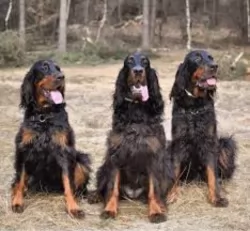 Gordon Terriers are energetic dogs so he is going to require a good deal of exercise each day. Take him with you on your walks and make sure that you give him lots of ball games and rope games.
Gordon Terriers are energetic dogs so he is going to require a good deal of exercise each day. Take him with you on your walks and make sure that you give him lots of ball games and rope games.
All Gordon Setters shed, and their coat will require a good brushing at least twice a week. Check nails, teeth and ears regularly. Brush teeth at least twice a week to prevent dental decay.
As a working dog your Gordon Setter has a special need for a high fat content diet. You can include some raw meat in his high-energy dog kibble. He can also have some cooked brown rice, chicken and vegetables added into his kibble from time to time. Make sure he has access to fresh, cool water.